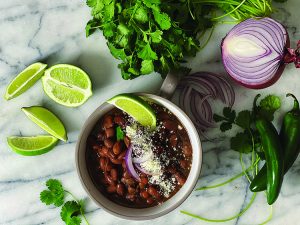DIVAS ON A DIME: Dried beans are power packed for pennies
By Patti Diamond — January 5, 2023
Dried beans are a budget-friendly substitute for meat protein. (www.JasonCoblentz.com)
In January we’re filled with fresh resolve to make the new year better than the last. For many people, that means reigning in both our waistlines and our wallets. If I told you I have one solution to both problems, and you said, “You’re full of beans,” you’d be right.
Ah, the humble bean. Here we have a budget-friendly vegetable protein with great fiber, loaded with vitamins and minerals, free of cholesterol and saturated fats, with a low glycemic index. Mix them with grains, and you have a complete protein that can replace the protein in meats. At a mere 25 cents per serving, dried beans are economical enough to feed the masses.
I recommend dried beans because they’re about one-third the cost of canned beans. Dried beans, properly prepared, taste much better, have better nutrition and less sodium. How many other times do you get a superior product for less money? So, keep some canned beans in your pantry for when you need convenience above all else. But for beans that taste so good you won’t want to share them, read on.
It takes minimal active time to prepare beans, and it’s easy work. It’s mindless stuff you can do while you’re on the phone with your sister.
As dried beans cook, they absorb the cooking liquid and triple in size. So 2 cups (1 pound) of dried beans will yield 6 cups of cooked beans. Incidentally, many recipes call for 15-ounce cans of beans, which is 1 3/4 cups of cooked beans.
Beans are prepared in three steps — clean, soak and cook. Unless you’re using a pressure cooker, then you can skip the soak.
First, inspect the beans, discarding any discolored or cracked beans and removing any rocks or debris. Beans are an agricultural product, and grit happens.
Next, we soak. Soaking beans allows them to rehydrate before cooking. Another benefit is that soaking reduces the phytic acid that can cause gassiness. You don’t need to soak split peas or lentils. These speedy beans only take about 30 minutes to cook.
Place 1 pound of cleaned beans in a large pot. For an overnight soak, add 8 cups of water and place in the fridge for eight to 24 hours. For a short soak, add 12 cups of water and bring to a boil on the stovetop for 5 minutes. Remove pot from the heat and let the beans soak in hot water for an hour. When finished, drain and rinse the beans in a colander.
Finally, we cook. To cook on the stovetop, cover the beans with fresh water by 2 inches, optionally adding one minced onion and 2 teaspoons salt, and bring them to a boil. Then lower the heat and simmer for 60 to 90 minutes, depending on the variety of bean (follow package directions), or until the beans are tender. To test for tenderness, mash a bean against the side of the pot with a spoon.
To cook in a pressure cooker, such as an Instant Pot, place 1 pound beans, 8 cups water, one minced onion, two bay leaves and 1 1/2 teaspoons salt in the inner pot of a pressure cooker. Secure lid on Instant Pot and close valve to “seal.”
Cook on high pressure for the following times: black beans, 30 minutes; chickpeas, 40 minutes; kidney beans, 35 minutes; pinto beans or navy beans, 25 minutes. Allow the pot to naturally release 20 minutes before doing a quick release.
Wishing you an abundant New Year and cool beans!
***
Lifestyle expert Patti Diamond is the penny-pinching, party-planning, recipe developer and content creator of the website Divas On A Dime — Where Frugal, Meets Fabulous! Visit Patti at www.divasonadime.com and join the conversation on Facebook at DivasOnADimeDotCom. Email Patti at divapatti@divasonadime.com
© 2023 King Features Synd., Inc.







